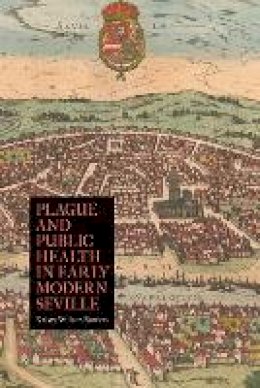
Stock image for illustration purposes only - book cover, edition or condition may vary.
Plague and Public Health in Early Modern Seville
Kristy Wilson Bowers
€ 121.96
FREE Delivery in Ireland
Description for Plague and Public Health in Early Modern Seville
Hardcover.
This study of sixteenth-century Seville offers a new perspective on how early modern cities adapted to living with repeated epidemics of plague. Plague and Public Health in Early Modern Seville offers a reassessment of the impact of plague in the early modern era, presenting sixteenth-century Seville as a case study of how municipal officials and residents worked together to create a public health response that protected both individual and communal interests. Similar studies of plague during this period either dramatize the tragic consequences of the epidemic or concentrate on the tough "modern" public health interventions, such as quarantine, surveillance and isolation, and the laxness or strictness of their enforcement. Arguing for a redefinition of "public health" in the early modern era, this study chronicles amore restrained, humane, and balanced response to outbreaks in 1582 and 1599-1600 Seville, showing that city officials aimed to protect the population but also maintain trade and commerce in order to prevent economic disruption. Based on extensive primary sources held in the municipal archive of Seville, the work argues that a careful reading of the records shows a critical difference between how plague regulations were written and how they were enforced, a difference that reflects an unacknowledged process of negotiation aimed at preserving balance within the community. The book makes important contributions to the study of early modern city governance and to the historiography of epidemics more broadly. Kristy Wilson Bowers received her PhD from Indiana University and teaches in the History Department at Northern Illinois University.
Product Details
Format
Hardback
Publication date
2013
Publisher
Boydell & Brewer Ltd United States
Number of pages
152
Condition
New
Number of Pages
152
Place of Publication
Rochester, United States
ISBN
9781580464512
SKU
V9781580464512
Shipping Time
Usually ships in 15 to 20 working days
Ref
99-15
Reviews for Plague and Public Health in Early Modern Seville
An insightful examination [and] an eloquent account of the difficulties of legislating and enforcing public health regulations on epidemic disease in the sixteenth and seventeenth centuries.
BULLETIN OF SPANISH STUDIES
Bowers has written a provocative study that offers new ways of thinking about urban pestilential experiences. Her subtle and diligent mining of archival materials makes her interpretation a particularly persuasive one.
ISIS
Bowers has written a great little book. In this well-researched case study of plague and the city of Seville's response to it, Bowers challenges our persistent image of the complete social and economic disruption most often associatedwith plague outbreaks. Her work reminds us that well-researched regional studies can reveal surprising challenges to what we assume we know about the early modern world and its 'premodern' response to public health threats.
BULLETIN OF THE HISTORY OF MEDICINE
This book provides a fresh alternative view of how public health worked in early modern Europe. Through exploring the archival records of Seville, Bowers examines the varied ways medical practitioners, public health officers, and lay people perceived and reacted against the plague epidemics of 1582 and 1599.
Jon Arrizabalaga,Institución Milà i Fontanals, Spanish National Research Council (CSIC), Barcelona
.
BULLETIN OF SPANISH STUDIES
Bowers has written a provocative study that offers new ways of thinking about urban pestilential experiences. Her subtle and diligent mining of archival materials makes her interpretation a particularly persuasive one.
ISIS
Bowers has written a great little book. In this well-researched case study of plague and the city of Seville's response to it, Bowers challenges our persistent image of the complete social and economic disruption most often associatedwith plague outbreaks. Her work reminds us that well-researched regional studies can reveal surprising challenges to what we assume we know about the early modern world and its 'premodern' response to public health threats.
BULLETIN OF THE HISTORY OF MEDICINE
This book provides a fresh alternative view of how public health worked in early modern Europe. Through exploring the archival records of Seville, Bowers examines the varied ways medical practitioners, public health officers, and lay people perceived and reacted against the plague epidemics of 1582 and 1599.
Jon Arrizabalaga,Institución Milà i Fontanals, Spanish National Research Council (CSIC), Barcelona
.
